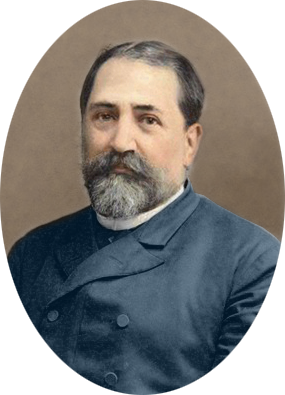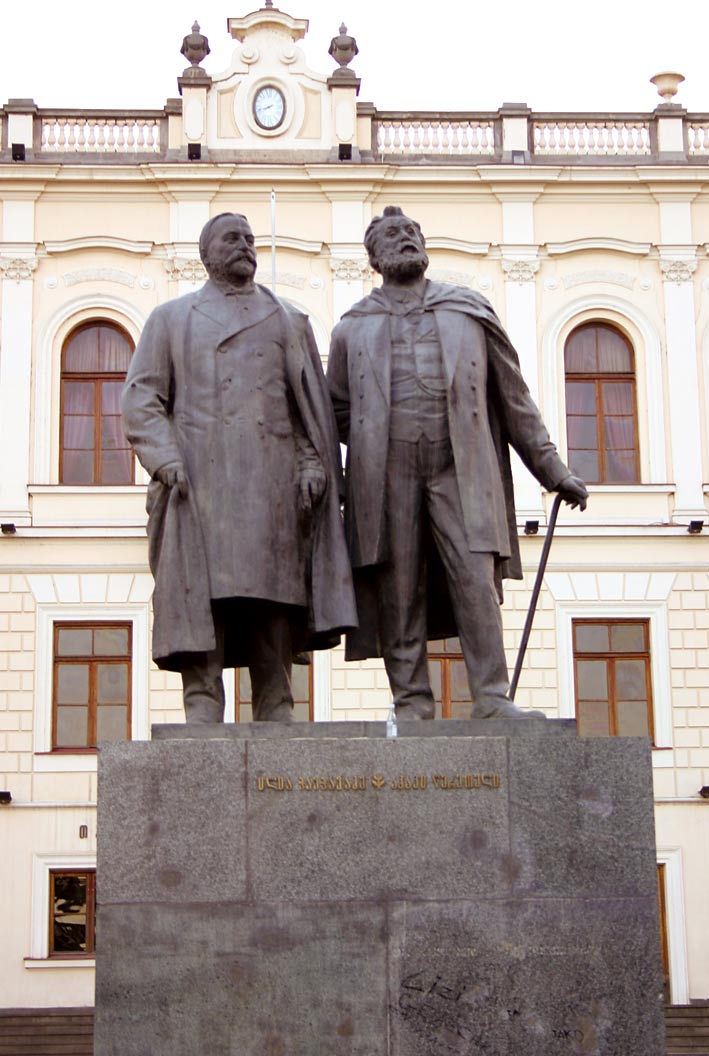![]() Yayınlanacağı yer Georgia - Sosyal etkileşim ve eğlence - 15 Nov 2016 04:52 - 1
Yayınlanacağı yer Georgia - Sosyal etkileşim ve eğlence - 15 Nov 2016 04:52 - 1
Inspired by the contemporary liberal movements in Europe, as a writer and a public figure, Chavchavadze directed much of his efforts toward awakening national ideals in Georgians and to the creation of a stable society in his homeland. His most important literary works were: The Hermit, The Ghost, Otaraant Widow, Kako The Robber, Happy Nation, Latters of a Traveller and Is a man a human?!. He was editor-in-chief of the periodicals Sakartvelos Moambe (1863–77) and Iveria (1877–1905), and authored numerous articles for journals. He was a devoted protector of the Georgian language and culture from Russification. He is considered the main contributor of Georgian cultural nationalism. The three main ethnic markers of Georgian identity, according to Chavchavadze, consisted of territory, language, and Christianity. Despite this, his nationalism was secular.
Chavchavadze was fatally wounded in Tsitsamuri, outside Mtskheta, by a gang of ins. His legacy earned him the broad admiration of the Georgian people. In 1987 he was canonized as Saint Ilia the Righteous (წმინდა ილია მართალი, tsminda ilia martali) by the Georgian Orthodox Church. Today, Georgians revere Chavchavadze as The Uncrowned King (უგვირგვინო მეფე,ugvirgvino mepe) and the "Father of Nation."

Ilia Chavchavadze was born in Qvareli, a village in Kvareli, located in the Alazani Valley, in the Kakheti province of Georgia, which was part of the Russian Empire at that time. Ilia was a tavadi, the Georgian title of prince. It is thought that the noble Chavchavadze family came from the Pshav-Khevsureti region of Georgia, and, in 1726, King Constantine II granted the Chavchavadze family the rank of Prince in recognition of their knighthood and valor to the nation. This resulted in the family moving and settling in the Alazani Gorge in Kakheti. According to King Erekle II's order, Ilia's great grandfather, Bespaz Chavchavadze was knighted when he defeated twenty thousand Persian invaders in Kvareli in 1755.
Ilia was the third son of Grigol Chavchavadze and Mariam Beburishvili. Grigol, like his father and his famous ancestors, had a military background. He, along with the local militiamen protected the village from numerous Dagestani invasions. This can be seen in the architecture of the Ilia Chavchavadze museum house in Kvareli, incorporating a Medieval castle style in the two-storey castle in the yard, which was designed to protect the house during invasions.
Chavchavadze was educated at the elementary level by the deacon of the village before he moved to Tbilisi where he attended the prestigious Academy for Nobility in 1848. However, from an early age, Ilia was influenced by his parents who were highly educated in l literature, Georgian history and poetry. From his parents, Ilia learned the inspiring stories of Georgian heroism in l historical novels. In his autobiography, Ilia refers to his mother, Princess Mariam Chavchavadze, who knew most Georgian novels and poems by heart and encouraged her children to study them. Ilia also described the influence of the deacon's storytelling, which gave him an artistic inspiration, later applied in his novel writing.
Ilia's mother, Mariam, died on 4 May 1848, when Ilia was ten years old, and his father asked his sister, Makrine, to help bring up the children. Aunt Makrine had a significant impact on Ilia's life, because, after 1852, when Ilia's father Grigol died, she was the only remaining caretaker of the family.
In 1848, after the death of Princess Chavchavadze, Ilia was sent to Tbilisi by his father to begin his secondary education. Ilia attended a private school for three years before he entered the 1st Academy of Tbilisi in 1851. Soon after, Ilia's father died and Aunt Makrine looked after the family. His secondary school years were very stressful, due to his father's death. However, the Chavchavadze family suffered another devastating blow when Ilia's brother, Constantine, was killed during the Dagestani raid on Kakheti. Ilia expressed his anguish and grief in one of his first short-poems called Sorrow of a Poor Man. In addition to his personal problems, the political situation in Georgia worsened under the harsh authority of the Russian Empire, which played a destructive role to the nation and its culture.
Student years
Bağış
MrNiCkYorumlar (1)



